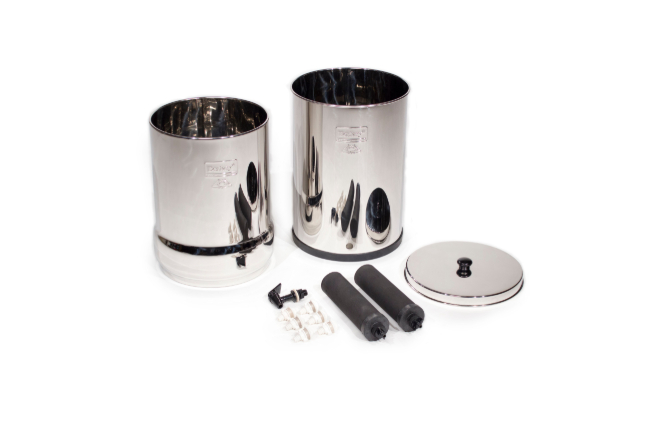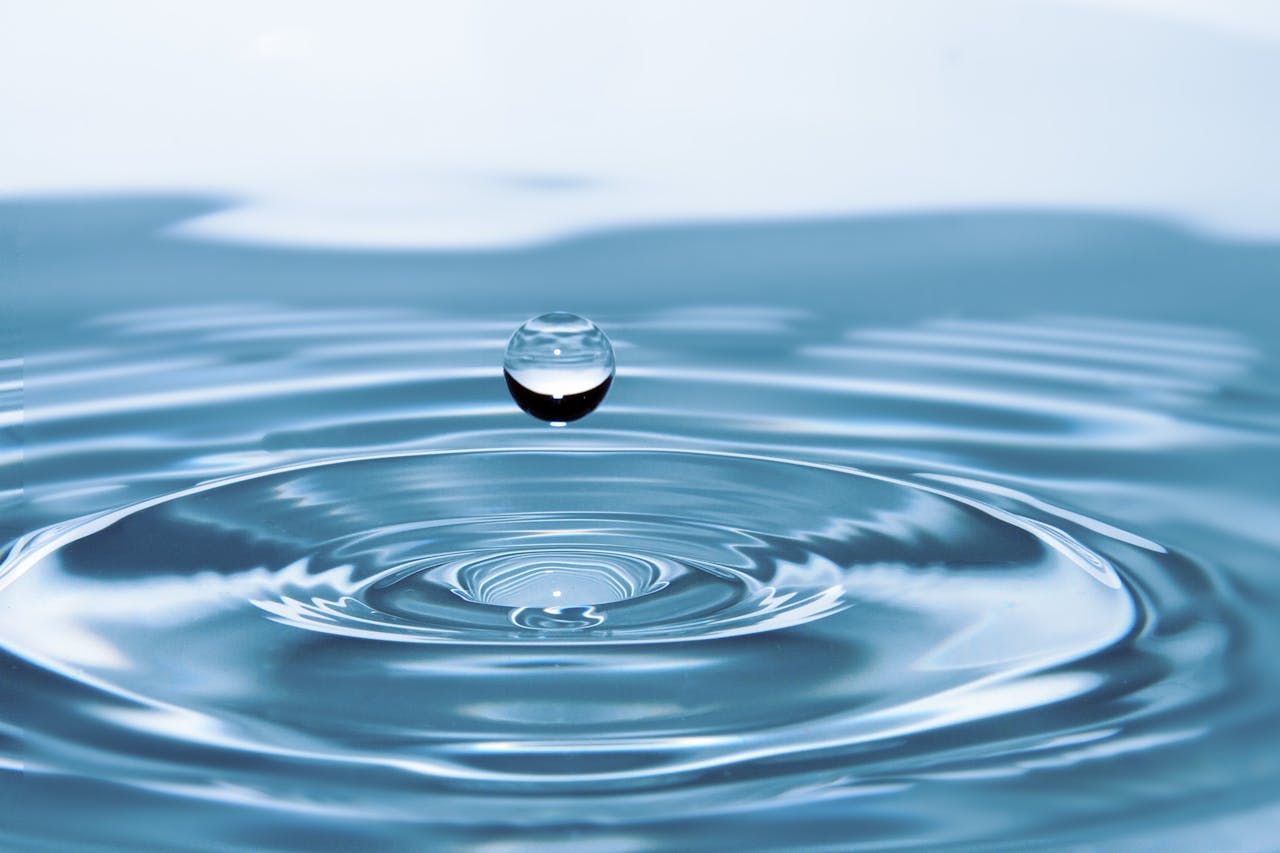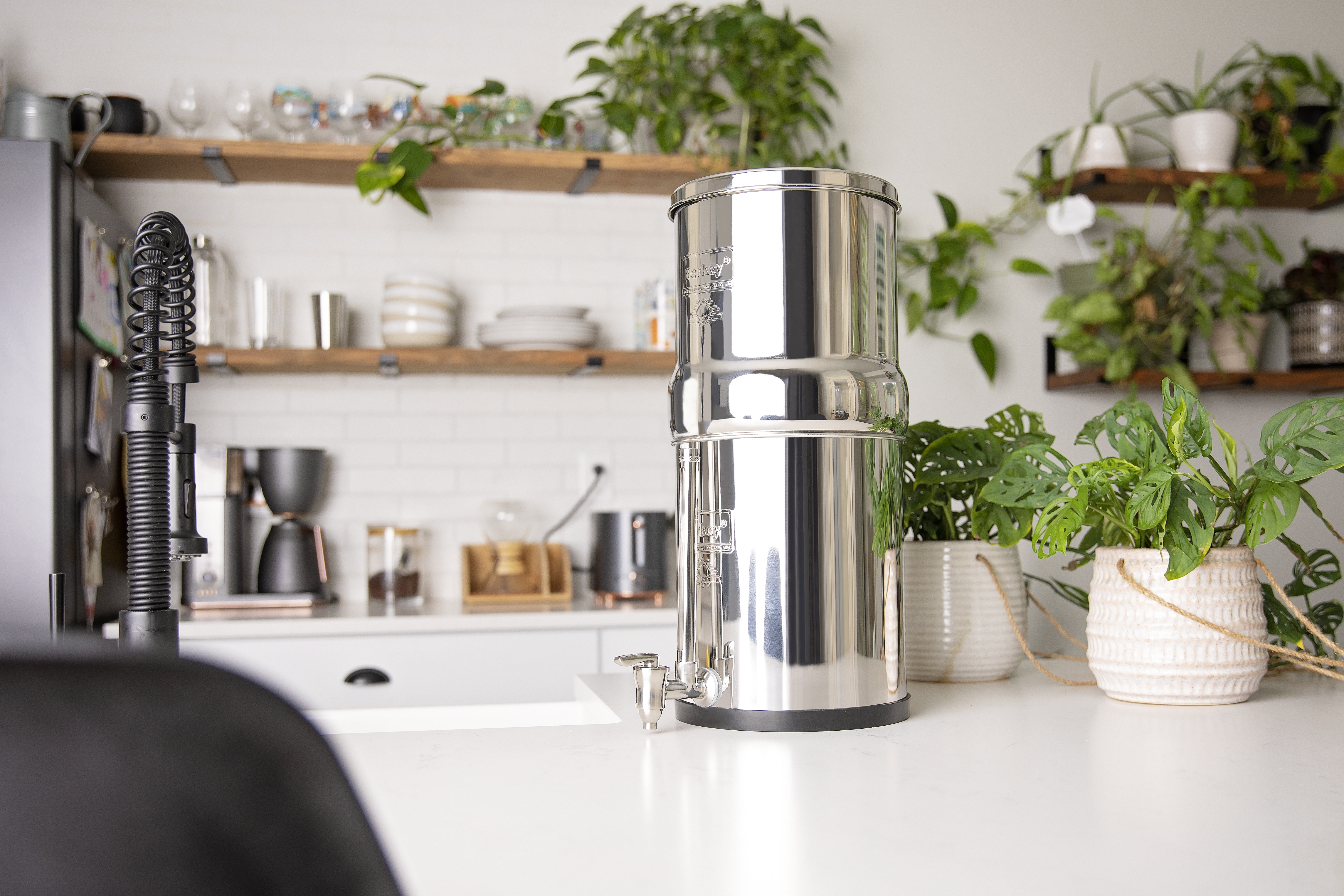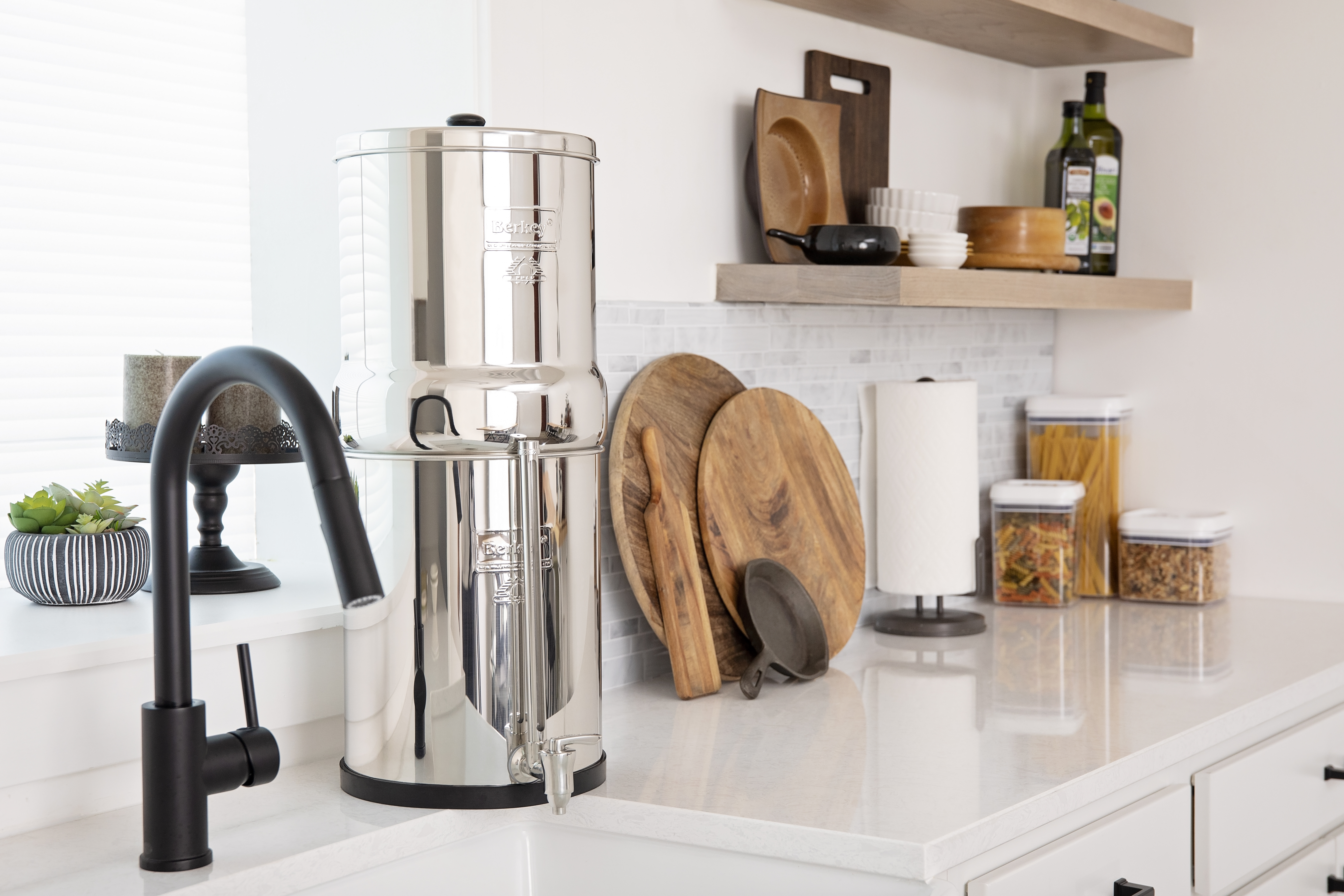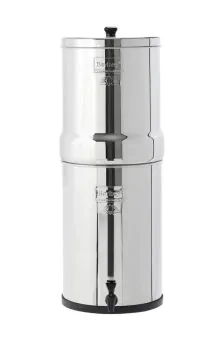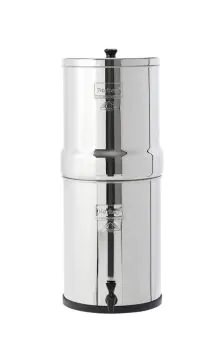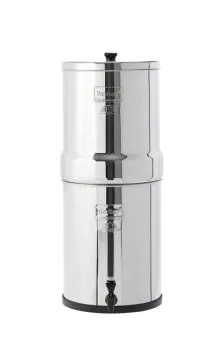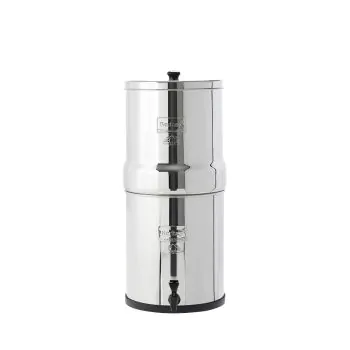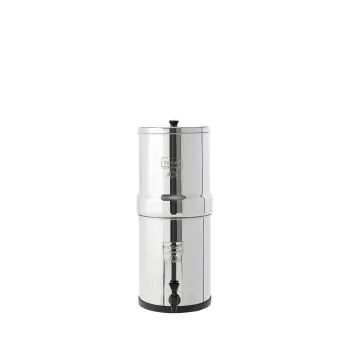Gravity-fed water filters are a simple yet effective solution for providing clean, safe drinking water.
Designed to remove contaminants like bacteria, sediment, and chemicals, they offer a convenient and eco-friendly way to ensure access to potable water, even in challenging conditions.
But are gravity water filters good? Or, in other words, are they as good as some people say? In this article, we’ll explore what gravity-fed water filters are, how they work, their benefits, and some things to keep in mind when using them.
Jump straight to the part of the article that interests you:
- What are Gravity-Fed Water Filters?
- How Do Gravity Water Filters Work?
- Pros of Gravity-Fed Filters
- Cons of Gravity Filters
- What to Consider Before Buying a Gravity-Fed Water Filter
- Types of Gravity Water Filtration Systems
What are Gravity-Fed Water Filters?
Gravity-fed water filters are a type of water purification system that relies on the natural force of gravity to pass water through a filtration medium, which traps and removes impurities and contaminants.
These systems are simple, portable, and do not require electricity or a water pump, making them an excellent choice for providing families with clean drinking water for household use. They ensure access to safe water during disasters or power/water outages, and offer a reliable source of potable water for off-grid living or when traveling to remote locations.
How Do Gravity Water Filters Work?
Gravity water filters typically have a two-chamber design, consisting of an upper chamber that holds the unfiltered water and a lower chamber that collects and stores the filtered water once it has passed through the filter media. During the filtration process, water from the upper chamber flows downward through the filter elements due to the force of gravity.
There are various types of filter elements available, including activated carbon filters, ceramic filters, and filters made from proprietary composite materials with dissimilar chemical or physical properties that allow them to target different contaminants.
As the water passes through the filters, they capture contaminants such as sediment, bacteria, viruses (depending on the filter media used), heavy metals, and chemicals such as chlorine and pesticides, to name a few.
However, it’s important to note that not all filters are created equal. The efficiency and effectiveness of a water filter are influenced by the type of filter media used. While some water filters are limited to filtering out contaminants such as sediment, bacteria, and taste and odors, good quality filters such as a Berkey Water filtration system fitted with Black Berkey filter elements can remove a much broader range of contaminants.
Once filtered, the water is collected and stored in the lower chamber, ready for use via a spigot or tap.
Pros of Gravity-Fed Filters
Gravity filters offer several benefits:
- Ease of Use: Their simple design makes them easy to operate. Just pour water into the top chamber and wait for it to percolate into the bottom chamber, ready to be tapped off.
- No Power Required: As they require no power to operate, they are ideal for areas without electricity or during power outages.
- Portable and Durable: They are typically designed to be lightweight yet durable, and easy to transport, making them perfect for outdoor activities or emergency preparedness.
- Cost-Effective: Compared to other filtration systems, they are relatively affordable and require minimal maintenance.
- Eco-Friendly: Long-lasting filter elements, such as the Black Berkey filter elements, which can filter 3000 gallons each (6000 gallons per pair) before needing to be replaced, reduce reliance on bottled water, decreasing plastic waste.
Cons of Gravity Filters
While gravity-fed water filters are an excellent solution for many situations, they might have certain features that some users might regard as drawbacks. Here are the key factors to consider:
- Relatively Slow Filtration Process: As gravity-fed filters rely on the natural pull of gravity, it can take several hours to filter a large volume of water. This can be overcome by filtering water overnight and storing the clean filtered water in a separate container.
- Manual Refilling Required: Unlike powered systems, gravity-fed filters do not have continuous water flow and require more hands-on operation.
- Limited Capacity: Smaller systems are designed to hold only a few gallons at a time, which may not be sufficient for large households or groups. If you need to cater to a large group of people, choose a larger system, such as an Imperial or Crown Berkey.
- Bulky Design: Even though gravity-fed filters are relatively lightweight and portable, some people may still find them too large, as they can take up significant counter or storage space. This may be viewed as a drawback in smaller homes or during travel. (Don't have enough space? You can opt for a smaller system, such as the more compact Travel Berkey.)
What to Consider Before Buying a Gravity-Fed Water Filter
Gravity-fed water filters are an excellent choice for ensuring access to clean water, but not all models are created equal. Before choosing a water filtration system, consider the following factors to ensure the filter meets your needs:
- Filtration Capabilities: Check the types of contaminants the filter can remove. Some filters target bacteria, viruses, and protozoa, while others also address heavy metals, pesticides, and microplastics. Match the filter's capabilities with your water source and quality concerns.
- Capacity: Determine the volume of water the filter can process and store. For individual or small family use, a compact unit may suffice. A higher-capacity model will be more practical for larger households or frequent use.
- Build Quality and Warranty: Consider the durability of the materials. Stainless steel units are long-lasting and easier to clean, while plastic models are lightweight and portable but may be less durable. Also, check whether the manufacturer or supplier offers any warranty.
- Ease of Maintenance: Gravity-fed filters require periodic cleaning and replacement of filter elements. Ensure the model you choose has readily available replacement parts and is easy to maintain.
- Portability: If you need a filter for travel, camping, or emergency preparedness, opt for a lightweight, compact design. For permanent installations, focus more on capacity and durability.
- Flow Rate: Gravity-fed filters process water at a slower pace than some other systems. Check the system's flow rate to ensure it aligns with your daily water consumption needs.
- Cost: Consider both the upfront cost of the unit and ongoing expenses for replacement filters. While some models may have a higher initial cost, they could offer better long-term value with lower maintenance costs.
- Tested to NSF Standards: Look for filters that have been tested to meet NSF International water quality standards to ensure performance and safety requirements are met.
- Design and Aesthetics: If the filter will be a permanent fixture in your kitchen or living space, consider a design that complements your home’s aesthetics.
By carefully evaluating these factors, you can select a gravity-fed water filter that not only meets your specific needs but also ensures that your water is safe and clean.
Types of Gravity Water Filtration Systems
Gravity-fed water systems offer a versatile solution for providing access to clean water, and they come in various designs to cater to different applications. Here's an overview of the main types available:
1. Countertop Gravity-Fed Filters
- Purpose: Ideal for home use to filter tap or well water.
- Key Features: These systems include a compact upper chamber for unfiltered water and a lower chamber for filtered water.
- Popular Materials: Often made of stainless steel or BPA-free plastic.
- Best For: Families, small households, or individuals seeking a permanent water filtration solution in their kitchen.
2. Portable Gravity Filters
- Purpose: Designed for outdoor adventures, travel, or emergency preparedness.
- Key Features: Lightweight, collapsible, and easy to carry. Many come with bags or pouches that fold for compact storage.
- Best For: Campers, hikers, and travelers who need safe drinking water from natural sources like rivers or lakes.
3. Ceramic Gravity Filters
- Purpose: Known for their ability to filter out bacteria and sediment.
- Key Features: Use ceramic cartridges that often include additional layers for removing contaminants like heavy metals and chlorine.
- Best For: Rural areas, developing regions, or households seeking a low-maintenance and durable system.
4. Multi-Stage Gravity-Fed Systems
- Purpose: Provides advanced filtration for a wide range of contaminants.
- Key Features: Include multiple filter stages, such as activated carbon, ceramic, or ion-exchange layers. Some models even have fluoride or arsenic filters.
- Best For: Households with specific water quality concerns or those needing comprehensive filtration.
5. Large-Capacity Gravity Filters
- Purpose: Designed to serve large groups or communities.
- Key Features: Large-capacity systems can hold several gallons of water and include durable construction for frequent use. The Crown Berkey has a storage capacity of 6 gallons (22.7 liters), making it ideal for large groups.
- Best For: Schools, camps, disaster relief, or community water needs.
6. Bucket or DIY Gravity Filters
- Purpose: Low-cost, simple solutions for filtration.
- Key Features: These systems are often assembled by users who source materials and parts from suppliers. If you decide to go the DIY route, it’s important to only use food-grade buckets or containers paired with high-quality gravity-powered filters made of the best materials. Only then you can be assured that the water you have filtered is clean and safe to drink.
- Best For: Budget-conscious individuals or emergencies where basic filtration is required.
Each type of gravity-fed water system has unique strengths tailored to specific scenarios. By understanding your water needs—whether for home, travel, or emergency preparedness—you can choose the right system for safe and reliable drinking water.
***
Is that all? No, we’ve only scratched the surface. Explore our blog to learn more about our gravity-fed filters and the contaminants they remove!
Berkey Water Filters
Gravity-Fed Water Filters: Frequently Asked Questions
What is gravity-fed water filtration?
Gravity-fed water filtration is a method of purifying water by using gravity to pass it through a filtration system, removing contaminants without the need for electricity or pressure.
Are gravity water filters worth it?
Gravity water filters offer excellent value for their versatility, ease of use, and ability to provide clean water in diverse settings, making them a worthwhile choice for many households and travelers.
Do gravity water filters remove bacteria?
Yes, gravity water filters are designed to remove bacteria, making water safe for drinking.
What are the benefits of a gravity filter?
Gravity water filters are cost-effective, eco-friendly, and portable systems that provide clean, safe drinking water without requiring electricity or complex installation.
Is reverse osmosis better than gravity filtration?
Reverse osmosis (RO) is more effective at removing a broader range of contaminants, including dissolved salts and ions. However, this strips the water of beneficial minerals the body needs for good health. Gravity filters not only retain essential salts and minerals, but they are also more affordable, eco-friendly, and easier to maintain, making them ideal for basic filtration needs or situations without access to electricity.

